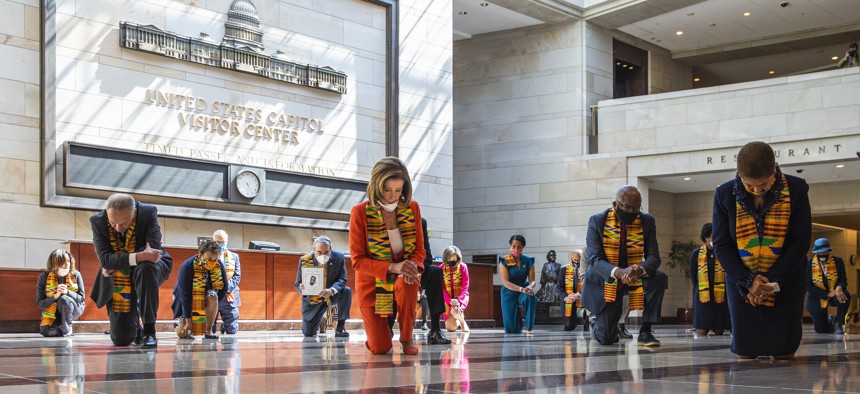Congressional Democrats Introduce Sweeping Police Reform Bill

House Speaker Nancy Pelosi, center, and other members of Congress, kneel and observe a moment of silence June 8, 2020, on Capitol Hill in Washington, reading the names of George Floyd and others killed during police interactions. AP Photo/Manuel Balce Ceneta
The legislation would seek to ban police practices such as chokeholds and no-knock warrants in drug cases, as well as require state and local police agencies to collect more data on officers' use of force.
Congressional Democrats proposed a wide-ranging set of policing reforms on Monday after the latest round of nationwide protests over the death of a black man in Minneapolis at the hands of police officers.
House and Senate lawmakers said the proposals will increase transparency and accountability in local law enforcement, although they stopped short of embracing demonstrators’ calls to defund police agencies.
Among the proposed reforms that lawmakers announced at a press conference Monday at the U.S. Capitol, the legislation would seek to ban the use of chokeholds, end officers’ use of no-knock warrants in drug cases, limit legal protections that often prevent victims of police brutality from pursuing civil litigation, and establish a National Police Misconduct Registry to track discipline and complaints against officers.
“Never again should the world be subjected to witnessing to what we saw on the streets of Minneapolis, the slow murder of an individual by a uniformed police officer,” said Rep. Karen Bass, head of the Congressional Black Congress, which took the lead drafting the legislation. "A profession where you have the power to kill should be a profession where you have highly trained officers accountable to the public.”
The Justice in Policing Act has more than 200 cosponsors in both the House and Senate, Bass said.
House Majority Leader Steny Hoyer said he plans to call the House back into session as soon as the bill is ready for a vote. But he expressed skepticism that there would be enough support in the Republican-led Senate to approve the bill, noting that lawmakers there had recently struggled to reach agreement over legislation that would make lynching a federal hate crime.
Across the country, protesters took to the streets over the last week to demand justice for George Floyd, a black man who died after a white officer in Minneapolis kneeled on his neck. Video of the arrest showed the officer continuing to pin Floyd with his knee for more than eight minutes, even as he pleaded “I can’t breathe.” The officer has since been arrested and is now charged with second-degree murder. Three other officers at the scene are charged with aiding and abetting murder.
The bill would incentivize state and local agencies to ban use of chokeholds by requiring their prohibition as a condition of certain federal grants and would also include chokeholds as a federal civil rights violation. It would also ban federal law enforcement agencies from carrying out no-knock warrants in drug cases and incentivize state and local agencies to do the same through grant stipulations.
The bill would also change the standard to evaluate whether officers’ use-of-force is justified.
“Right now the question asked if there is police misconduct and excessive use of force is ‘Was it reasonable?’ As we know, we can reason away just about anything,” said Sen. Kamala Harris. “The appropriate and fair question to ask is whether it was necessary.”
The legislation also places an emphasis on collecting more data on law enforcement actions. Under the bill, a nationwide police misconduct registry would compile data on officer complaints, discipline, and terminations to “prevent problematic officers who are fired or leave one agency, from moving to another jurisdiction without any accountability,” a summary of the bill states. State and local law enforcement agencies would also be required to collect data on all incidents in which use of force is deployed against a civilian or against a law enforcement officer.
At Monday’s press conference, House Speaker Nancy Pelosi noted that beyond the police reforms included in the bill, broader action will be needed to address racial inequalities in the United States and called the legislation a first step at addressing those problems.
“True justice can only be achieved with full comprehensive action,” she said.
A coalition of civil rights groups backed the plan, calling it “an important step toward police accountability.” The groups include the Lawyers’ Committee for Civil Rights Under Law, NAACP, National Urban League and National Action Network.
“This legislation makes clear that police brutality, misconduct, harassment, and killing have no place in America,” the groups said in a joint statement. “Many provisions in the bill reflect the insights of national and local civil rights organizations that have worked for years on these issues.”
Andrea Noble is a staff correspondent for Route Fifty.
NEXT STORY: State and local government unemployment still climbing





